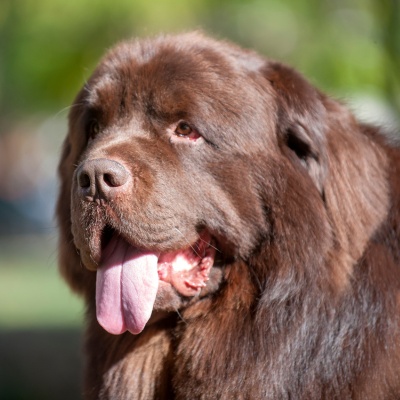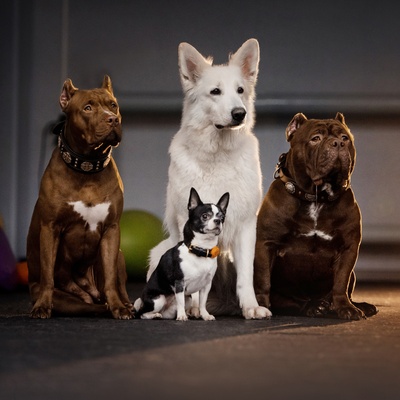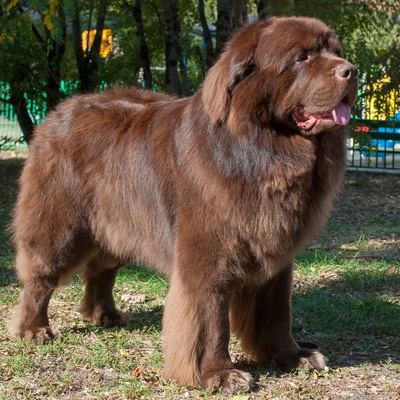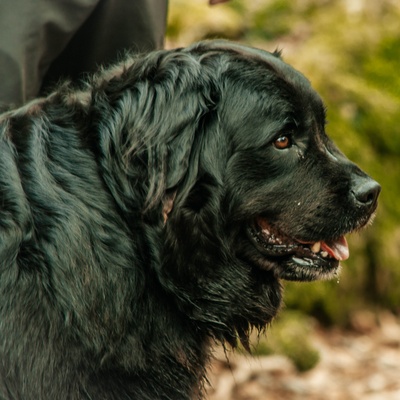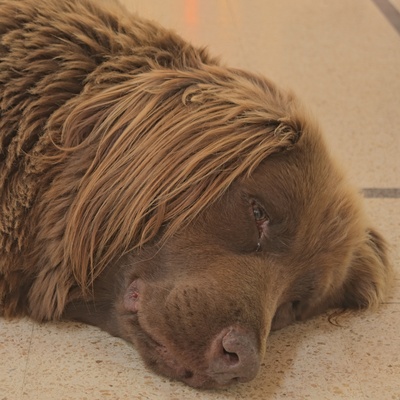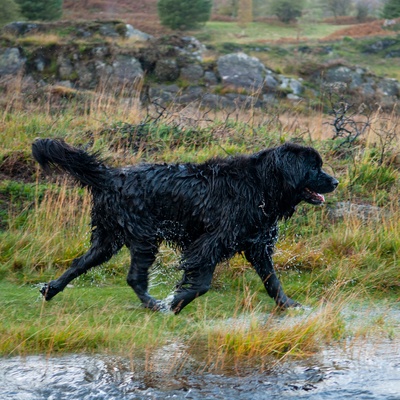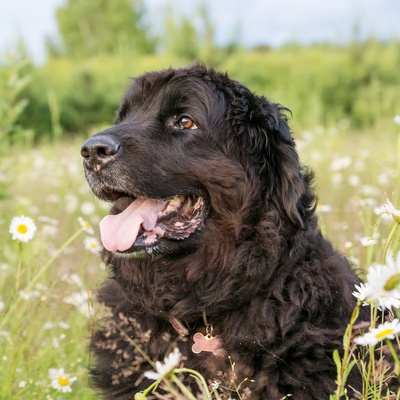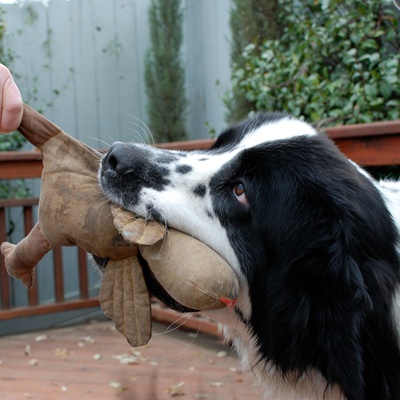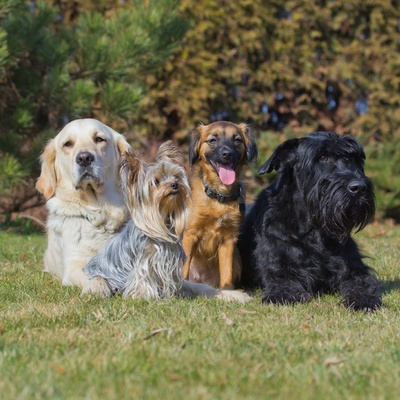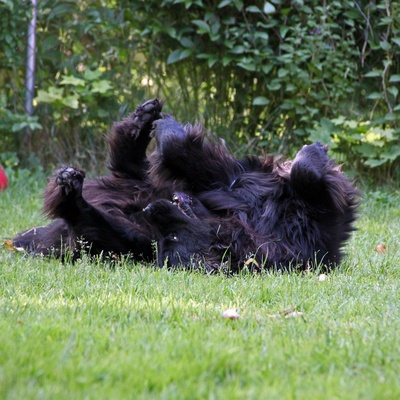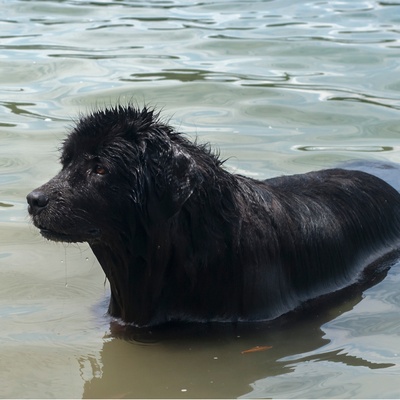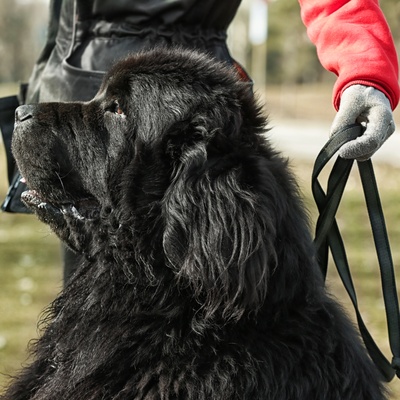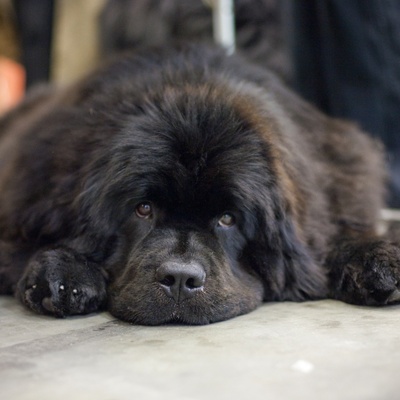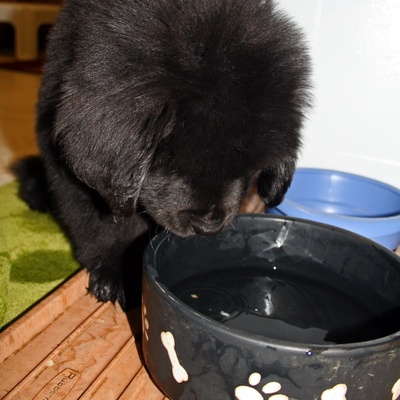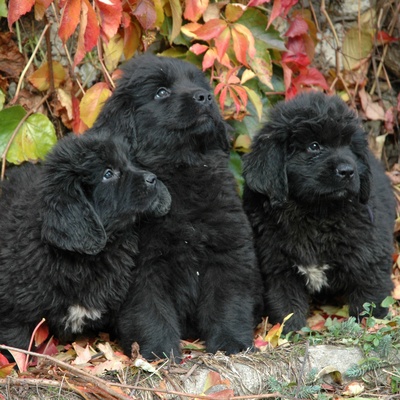Introducing the Newfoundland Dog
Discover all there is to know about the Newfoundland Dog: its characteristics, behavior, training, and its cost.
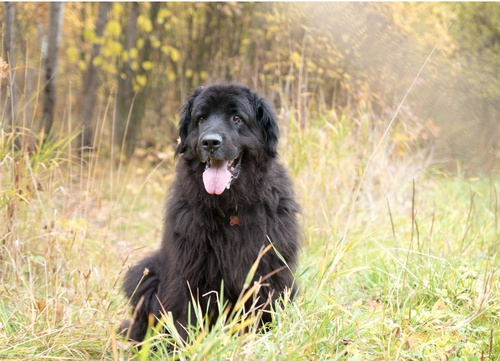
Discover all there is to know about the Newfoundland Dog: its characteristics, behavior, training, and its cost.
The Newfoundland Dog, often called the "Newfie," hails from Newfoundland, Canada, and was originally bred for water rescue and work. Known for their large size and gentle nature, Newfies are beloved worldwide for their bravery and versatility. They excel as loyal companions, rescue dogs, and therapy animals.
Newfoundland Dogs are friendly, sociable, and highly affectionate. Their calm demeanor and devotion make them excellent family pets, always eager to please and shower their owners with love.
This section outlines the unique features of the Newfoundland Dog.
The Newfoundland Dog, part of the working group, is bred for tasks like guarding, sled pulling, and rescue work. Renowned for their strength, endurance, and dependability, they have a gentle and friendly temperament.
The Newfoundland Dog is a very large breed. Males typically stand 28 inches tall and weigh between 130 to 150 pounds, while females are slightly smaller, standing 26 inches tall and weighing between 100 to 120 pounds.
Newfoundland Dogs have a long, water-resistant double coat. The outer coat is coarse and flat, while the undercoat is soft and dense, providing excellent insulation.
The Newfoundland Dog's coat can vary in color. The most common color is black, but they can also be brown, gray, or Landseer (white with black markings).
Newfoundland Dogs adapt well to various environments but thrive best in homes with access to outdoor space where they can exercise.
Newfoundland Dogs are exceptionally friendly and sociable. They are great with children and generally get along well with other animals, making them ideal family pets.
Newfoundland Dogs are generally healthy but can be predisposed to joint diseases such as hip dysplasia and elbow dysplasia. They may also suffer from certain heart conditions.
The Newfoundland Dog is a gentle and intelligent breed, making them relatively easy to train. They respond best to positive reinforcement methods that involve kindness and patience.
We can help!
Every dog has its own character, and so do you. Making the right choice will ensure his well-being and yours.
Take our quiz to find out which breed is right for you, based on your personality, lifestyle, location and many other criteria.
Don't wait any longer and take the quiz to find out the answer!
Newfoundland Dogs are known for their immense size and balanced, powerful build. They have a distinctive black, brown, or Landseer coat that is water-resistant, and their expressive, kind eyes are a hallmark of the breed.
The Newfoundland Dog is a large breed. Females typically stand between 26 and 28 inches tall, while males can reach up to 30 inches. Females usually weigh between 100 and 120 pounds, and males weigh between 130 and 150 pounds. Newfoundland puppies grow quickly, reaching significant size milestones within the first few months. They typically reach their full adult size and weight by the age of two.
Newfoundland Dogs have a long, dense double coat. The outer coat is coarse and water-resistant, while the undercoat is soft and thick. This combination gives the fur a slightly wavy texture, providing excellent protection against cold and wet conditions.
The Newfoundland Dog's coat comes in a specific color palette, including black, brown, gray, and Landseer (white with black markings). These colors highlight the breed's striking appearance and are a key characteristic of the Newfoundland Dog.
The Newfoundland Dog has a long and thick coat with a dense undercoat, requiring regular maintenance. They shed their fur year-round, with increased shedding during the spring and autumn. To keep their coat in good condition, daily brushing is recommended to remove loose hair and prevent matting. Regular grooming sessions are essential to manage their thick fur, ensuring they remain comfortable and their coat stays healthy. Additionally, occasional baths every few months can help keep their coat clean, but it's important to use gentle, dog-friendly shampoo to avoid skin irritation.
The Newfoundland Dog is known for its loyalty, protective nature, and affection. These gentle giants are easygoing and form strong bonds with their families.
There are currently no fewer than 400 breeds of dog, divided into 10 groups. Each group comprises breeds with shared features.
The Newfoundland Dog belongs to the working group, which includes breeds like the Saint Bernard, Siberian Husky, and Great Dane. This group is known for its strong, dependable, and hardworking dogs. Breeds in this category are typically used for tasks such as guarding, sled pulling, and rescue work. They possess a remarkable combination of strength, intelligence, and endurance.
Newfoundland Dogs are particularly noted for their exceptional swimming ability and gentle disposition. They are intelligent, docile, and highly affectionate, making them excellent family pets and loyal companions. Their primary role historically has been in water rescue, leveraging their strength and swimming skills to save lives.
Newfoundland Dogs are often described as gentle giants due to their calm and affectionate nature. They form strong bonds with their owners, displaying immense loyalty and love. These dogs thrive on companionship and require a present and attentive owner to support their emotional well-being and development.
Newfoundland Dogs are known for their sociability and generous spirit. They get along well with humans and are especially good with children, making them excellent family pets. Their natural friendliness means they are comfortable around strangers and other animals. However, it's crucial to work on their social skills from a young age to ensure they grow up to be well-adjusted and happy companions.
Take the test and find out the dog breed that matches your personality and lifestyle.
Newfoundland Dogs have the potential to adapt to different living situations, whether it's an apartment, house, urban, or rural environment. However, they require plenty of attention and companionship from their owners. To keep them happy and healthy, it's recommended to take them for at least two walks a day, each lasting around 30 minutes.
While Newfoundland Dogs can adapt to various environments, they thrive best in homes with access to outdoor spaces where they can explore and expend their energy. An outdoor environment is crucial for satisfying their curiosity and allowing them to stay active, which is essential for their physical and mental well-being.
Newfoundland Dogs are known for their ease of learning and superior intelligence. They respond well to positive reinforcement techniques, making training sessions effective and enjoyable. It is essential to use communication, understanding, and rewards to motivate these dogs. Despite their gentle nature, Newfoundland Dogs can be independent thinkers, so patience and consistency are key. To ensure their safety, especially given their size and strength, equipping them with a GPS collar, such as those offered by Weenect, can help prevent losses or escapes.
Newfoundland Dogs possess excellent listening skills, which make them highly trainable. Their natural inclination to please their owners makes them responsive to commands and eager to learn. These dogs also have a unique training characteristic: their affinity for water. Incorporating water activities into their training can be highly beneficial. Additionally, early socialization with other dogs and people is crucial to developing their well-rounded and friendly nature. Properly trained Newfoundland Dogs are incredibly obedient and make excellent companions.
Newfoundland Dogs are generally healthy, but they require daily care to maintain their well-being and prevent diseases and infections. Regular attention to their health needs ensures they remain robust and happy.
Newfoundland Dogs are generally healthy and robust, but like any breed, they have specific health predispositions. They are prone to hip dysplasia, elbow dysplasia, and certain heart conditions such as subvalvular aortic stenosis. These conditions can cause pain and mobility issues, and in the case of heart problems, can affect their overall health and lifespan. Newfoundland Dogs typically have a lifespan of 8 to 10 years.
Regular veterinary care is essential throughout a Newfoundland Dog's life. This includes vaccinations, deworming, and parasite treatments as recommended by the vet. Daily care routines are crucial to their health and well-being. This includes brushing their thick coat to prevent matting and reduce shedding, cleaning their ears weekly to prevent infections, brushing their teeth regularly to prevent tartar buildup, and trimming their nails to avoid overgrowth and related issues. Owners should also be aware of potential allergies and consult with a vet for appropriate recommendations. The Newfoundland Dog is not a hypoallergenic breed.
Like all dogs, Newfoundland Dogs have specific nutritional needs, and a balanced diet is crucial for maintaining their vitality and strength. It is essential to ensure that their diet is rich in proteins and vitamins to meet their nutritional requirements. We recommend feeding your Newfoundland Dog premium kibble suitable for large breeds, as it provides a balanced dietary foundation. For additional protein needs, you can supplement their diet with lean white and red meat, but it is important to limit fats to avoid health issues.
Newfoundland Dogs are known for their hearty appetites, so it's important to feed them at set times and only give them the amount they need to maintain a healthy weight.
The Newfoundland Dog is a well-regarded breed known for its gentle nature and impressive strength. There are several reputable breeders for this breed, but it's important to consider several factors before adopting.
Before adopting a Newfoundland Dog, there are some important points to consider. First and foremost, you need to check that the breeder is reputable. This means visiting the breeder's premises to assess the living conditions and behavior of the dogs. Responsible breeders will provide transparent information about the puppy's health and any genetic illnesses in its lineage.
Lastly, mandatory electronic identification, like microchipping, is not always mandated at the federal level in the United States for cats and dogs. But microchipping is widely acknowledged as a successful way to permanently identify pets and increase the possibility of reuniting lost pets with their owners, even in the absence of universal regulations. As a pet owner, it is advised to inform yourself about municipal laws to ensure the safety and wellbeing of your pet.
The acquisition cost of a Newfoundland Dog can vary based on several factors. Factors influencing the purchase price include lineage, pedigree, the reputation of the breeder, and the age of the dog. Newfoundland Dog puppies typically cost between
and
from a breeder.
Additionally, maintaining this breed involves ongoing costs, including veterinary fees, food, grooming, and other essentials. These annual expenses can range from
to
Choosing a dog that matches your personality and lifestyle will ensure your well-being and his!
